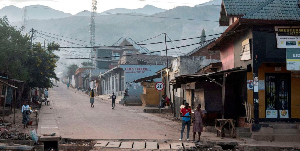Stakeholders in the Bongo District of the Upper East Region have pledged their commitment to help fight against teenage pregnancy, Sexual and Gender-Based Violence (SGBV) and child marriage in the district.
The stakeholders who were made up of the heads of the various units at the Bongo district assembly made the commitments when the Youth Harvest Foundation Ghana (YHFG), a youth-focused Non-Governmental Organization engaged them on gender equality, Adolescent Sexual and Reproductive Health (ASRH) and Gender-Based Violence (GBV) issues at Bongo on Monday.
The project dubbed, “Safe and Protective Environment for Adolescent Development” (SPREAD) project and funded by Global Affairs Canada through UNICEF, is being implemented in 30 communities in six districts in the Upper East Region namely Builsa South, Bongo, Talensi, Bawku West, Kassena Nankana West and Nabdam.
It seeks to build the capacities of adolescents and communities including their structures and duty bearers to create an enabling environment that protects children, prevents early and forced marriages and teenage pregnancies as well as prevent and respond to Sexual and Gender-based Violence (SGBV).
The participants including the Heads from the Ghana Health Service (GHS), Ghana Education Service (GES), Department of Social Welfare and Community Development (DSWCD), National Commission for Civic Education (NCCE) and the Planning and Budget officers of the district, indicated that there were proud of the successes chalked so far under the project and attributed that to the formidable partnership and well-coordinated efforts of the stakeholders.
They declared that they would continue to provide the support to ensure that the project succeeds to help reduce the menace of teenage pregnancy and child marriage in the district.
Mr. John Azam, Director of DSWCD, who expressed worry about the high prevalence of teenage pregnancy and child marriage in the district, said his outfit has been collaborating with NGOs like the YHFG and Assembly to help confront the problem.
He observed that when girls are empowered, they would make informed choices about their SRH issues and stated that his outfit has been collaborating with NGOs like YHFG to help curb the problem.
Mrs. Yadeh Evelyn, who represented the District Director of GES, observed that the COVID-19 pandemic contributed immensely to worsening vulnerability of girls particularly exposing many of the girls in the District to teenage pregnancies and child marriage.
“COVID-19 has worsened the vulnerability of girls in terms of pregnancies and child marriage. Records regarding pregnancies among the SHS and JHS students who returned to school to finish up their sessions does not look good for us. Some girls could not return because they were either pregnant or had gotten married. Though some pregnant girls reported to school which is a piece of welcoming news. We have a lot to do as stakeholders and parents,” he disclosed.
Mrs. Florence Gyimah, a Public Health Officer stated that the GHS partnership with YHFG-SPREAD project team on Adolescent Sexual and Reproductive Health, (ASRH) had been very beneficial to the adolescents in the selected communities.
She admonished the various stakeholders and duty bearers to sustain the sensitization efforts which she observed is changing lives.
“You see, the issues about adolescent pregnancies and child marriage can be pointed to one thing, lack of or inadequate reproductive health education. We need to sensitize parents alike on SRHR issues so that they can be well informed to provide guidance for their children”, she said.
The Project Officer at YHFG, Albert Apotele Nyaaba explained that the stakeholder’s engagement forum was aimed at ensuring that they receive information and develop skills to support adolescent girls make informed choices and become more accountable on ASRH issues.
He urged the stakeholders to deepen collaboration and develop innovations to empower adolescents to make informed choices and become accountable on SRH issues.
He indicated that when adolescent-friendly health services are closer to the adolescents through community and club engagements, it helps to reduce teenage pregnancies, SGBV and end child marriage.
Regional News of Wednesday, 30 December 2020
Source: Samuel Adadi Akapule, Contributor













